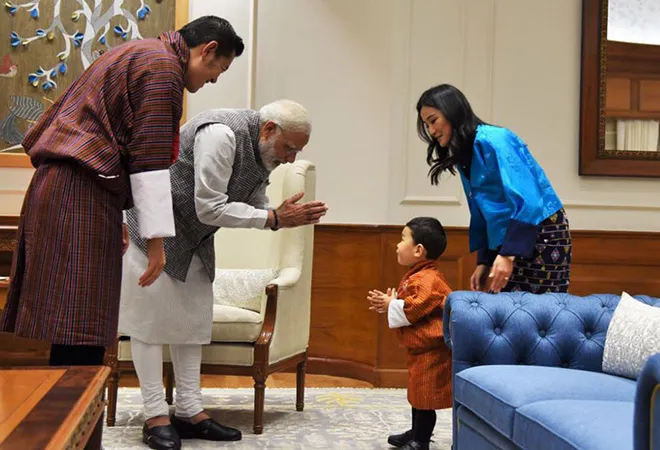-
CENTRES
Progammes & Centres
Location

The king and queen of Bhutan, Jigme Khesar Namgyel Wangchuck and Jetsun Pema Wangchuck, visited India recently. The four-day visit was significant for many reasons. It was the first visit by Bhutanese royalty since the 73-day-old standoff on the Doklam plateau in the Himalayan kingdom which saw the Indian and Chinese militaries virtually going head to head.
With this visit, Bhutan sent a strong message that the special relationship between New Delhi and Thimphu remains intact. After all, the Doklam crisis started when a People's Liberation Army unit tried to build a road toward a Royal Bhutan Army camp on the Doklam plateau. The Bhutanese protested and were supported by the Indian army's demand that China cease its efforts. Bhutan shares a unique relationship with India, which is largely responsible for its military security. As per the 2007 India-Bhutan Friendship Treaty, the two nations cooperate "closely... on issues relating to their national interests. Neither government shall allow the use of its territory for activities harmful to the national security and interest of the other."
Thimphu showed courage by standing up to a behemoth like China with India's help. It is important for India to stand up for one of its closest allies.
Expressing deep concern over China's construction of a road in the disputed area, New Delhi conveyed to Beijing that such an action would represent a significant change of status quo with "serious" security implications for India. For its part, Bhutan issued a démarche asking Beijing to return to the status quo ante.
Although Bhutan became a democratic, constitutional monarchy in 2008 and its king now serves only as the head of state, his imprint on decision-making remains significant. The king's visit underlined the shared cultural links that bind India and Bhutan together.
At a time when China is trying its best to wean Bhutan away from India, these signals matter. The previous Bhutanese prime minister, Jigme Thinley, made overtures to Beijing, meeting his Chinese counterpart on the sidelines of the United Nations Conference on Sustainable Development at Rio de Janeiro in 2012 in an attempt to lobby for Bhutan's candidacy for the non-permanent seat in the UN security council. Such a foreign policy shift was perceived as being unfavourable to Indian sensitivities. China's economic engagement with Bhutan is also likely to grow in the future, especially as China's infrastructure development leads to greater connectivity between the two countries.
Besides India, Bhutan is the only country with a land border dispute with China. The latter's slow encroachment into Bhutanese territory is making Bhutan eager for an early boundary settlement.
If such a settlement allows China access to disputed areas in the Chumbi Valley, a tri-junction abutting Bhutan, Tibet and Sikkim, Indian security interests will suffer significantly. So India has been shoring up its own profile. It has remained Bhutan's largest development partner. With the Treaty of Friendship and Cooperation, to reflect the need for a more symbiotic relationship, India has made efforts to dispel concerns regarding its hegemonic tendencies in its neighbourhood. India views Bhutan as a major source of hydropower in the coming years and is seeking greater access for its energy companies.
A strong Delhi-Thimphu relationship is important for the success of the Narendra Modi government's 'neighbourhood first' policy. At a time when India seems to have given up on the South Asian Association for Regional Cooperation and is investing in alternatives like the Bay of Bengal Initiative for Multi-Sectoral Technical and Economic Cooperation, Bhutan is key for the operationalization of such initiatives. The hermit kingdom of South Asia is opening up to the world. A Bhutan that is fully integrated into the world community can only be good for India. The Modi government will have to ensure that Bhutan does not get relegated to the margins once other foreign policy priorities crowd the Indian agenda.
This commentary originally appeared in Telegraph India
The views expressed above belong to the author(s). ORF research and analyses now available on Telegram! Click here to access our curated content — blogs, longforms and interviews.

Professor Harsh V. Pant is Vice President – Studies and Foreign Policy at Observer Research Foundation, New Delhi. He is a Professor of International Relations ...
Read More +